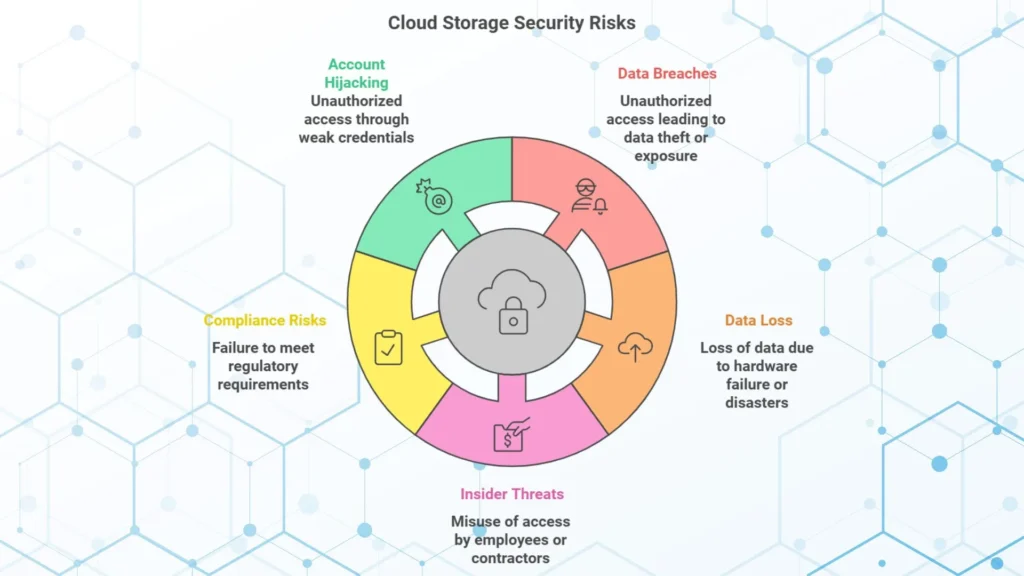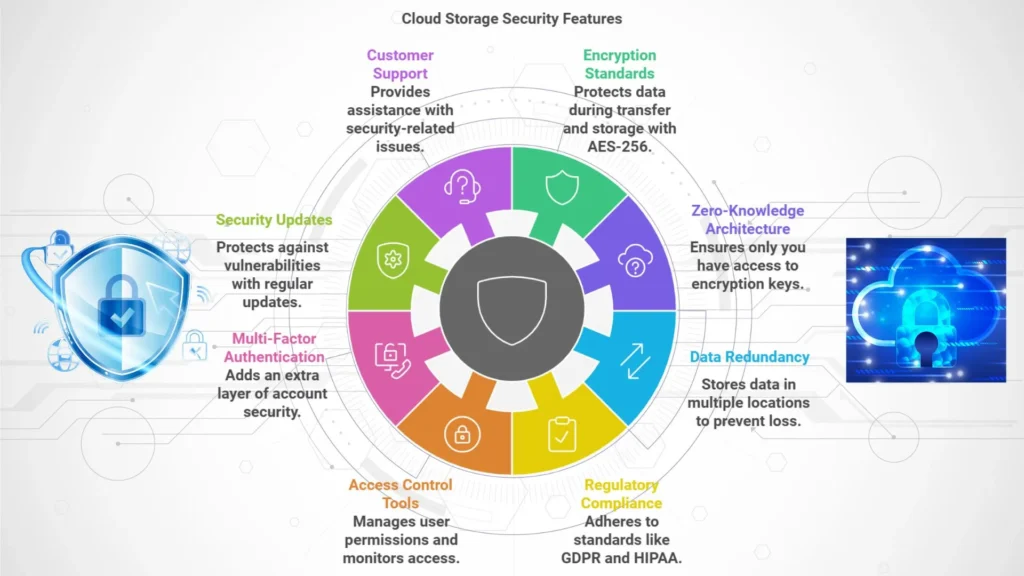Now a days, cloud storage has become an essential tool for businesses and individuals. However, the convenience of cloud storage comes with the responsibility of ensuring data security.
In this article we shall discuss how does cloud storage ensure Data Security, along with common security concerns with cloud storage and cloud service providers, best practices to keep data secure in the cloud.
Additionally, we shall discuss key features to look for, in secure cloud storage options, especially for the businesses who handle sensitive data.
Common Security Concerns with Cloud Storage
Following are the data security concerns which need to be considered:
1. Data Breaches:
Cloud storage providers store large amounts of data, which makes them a soft target for cybercriminals. Unauthorized access can lead to data theft or exposure, which harms businesses and individuals.
2. Data Loss:
A data loss incident in the cloud can result from hardware failure, natural disasters or inadequate backup solutions, which affects data availability. Without proper backup and recovery measures, it is difficult or impossible to retrieve lost data and restore the system.
3. Insider Threats:
Employees or contractors with access to sensitive data can pose a risk if they misuse their access with malicious intent or unintentional mishandling of data. This can compromise sensitive business information. Insider threats can be intentional or accidental, but both can have severe consequences.
4. Compliance Risks:
Businesses in sectors like healthcare or finance must meet strict regulatory requirements (e.g., GDPR, HIPAA). Failing to comply with these can lead to penalties.
5. Account Hijacking:
Weak credentials, phishing attacks or reused passwords increase the risk of unauthorized access to cloud accounts. Inadequate encryption can leave data vulnerable to interception and unauthorized access.

Best practices for enhanced data security with Cloud Storage:
To have cloud storage with enhance data security, following practices should be followed:
1. Use Strong Authentication:
Implement multi factor authentication (MFA) for all accounts with cloud access, which adds an extra layer of security beyond passwords. Use role based access controls to limit access to sensitive data. Ensure that only authorized personnel have access to specific data sets and regularly review access permissions.
2. Encrypt Data in Transit and at Rest:
Ensure that all data in transit and stored in the cloud is encrypted to protect it from unauthorized access. Use strong encryption algorithms and manage encryption keys securely.
3. Manage Access Controls:
Apply the principle of least privilege (PoLP) to limit access to only those who need it. Role based access control (RBAC) is also effective for managing permissions within organizations.
4. Implement Regular Audits and Monitoring:
Regularly monitor and audit access logs to your data. Use logging and monitoring tools, conduct security audits to identify any unusual activity or potential vulnerabilities. This will enable you to detect suspicious activities and respond promptly to potential security incidents.
5. Back-Up Data Periodically:
Perform regular backups of your data and store backup copies in multiple locations. This ensures that data can be recovered in case of accidental deletion or system failures. Many cloud services offer built in backup features.
6. Educate Employees:
Educate employees about best practices for data security. Conduct regular training sessions to ensure that employees are aware of the latest security threats and how to mitigate them.
7. Evaluate Cloud Providers Carefully:
Ensure that your cloud provider complies with industry regulations and maintains security certifications like ISO 27001 or SOC 2.

Secure Cloud Storage Options: What to Look For
When choosing a cloud storage solution, it is essential to consider providers with a strong emphasis on security. Here are key security features to look for when selecting a cloud storage provider, especially for businesses which handle sensitive information.
Key Security Features in Cloud Storage
1. Encryption Standards:
Choose cloud storage providers that offers end-to-end encryption, which protects your data from unauthorized access during both transfer and storage. AES-256 encryption is an industry standard for securing data.
2. Zero Knowledge Architecture:
With zero knowledge encryption, only you have access to your encryption keys. This ensures that the cloud storage provider can’t read your data. Providers like Sync.com and Tresorit offer this feature.
3. Data Redundancy:
Choose cloud storage services that offer data redundancy and geographic distribution. This ensures that data is stored in multiple locations, which reduces the risk of data loss due to regional failures.
4. Regulatory Compliance:
Check if the provider complies with industry standards relevant to your business, such as GDPR, HIPAA, ISO/IEC 27001 or PCI-DSS. Compliance ensures that the provider follows best practices for data security and privacy.
5. Access Control and Monitoring Tools:
Look for built-in tools to control user permissions and monitor access logs. Providers like Google Workspace and Microsoft OneDrive offer advanced access controls and monitoring.
6. Multi Factor Authentication (MFA):
An essential security feature, MFA protects your account even if a password is compromised.
7. Regular Security Updates and Patching:
Providers should have regular security update schedules to protect against the latest vulnerabilities and advanced threat detection.
8. Customer Support
Select providers that offer reliable customer support and assistance with security related issues. Responsive customer support can help to detect security concerns and provide guidance on best practices.
Top Secure Cloud Storage Providers for Businesses
Here are some top rated cloud storage providers known for their security features:
Microsoft OneDrive for Business:
Offers encryption at rest and in transit, MFA and integration with Microsoft’s security ecosystem, which makes it ideal for enterprise use.
Google Workspace:
Provides extensive encryption options, strong access controls and compliance with major regulations, which ensures strong data protection for business environments.
Box:
Known for its security features. This includes granular access controls, Box KeySafe (for key management), and compliance with various industry standards.
Tresorit:
This provider offers end-to-end encryption and a zero knowledge policy. This is ideal for industries requiring high data privacy levels, such as healthcare or legal.
AWS Cloud Storage:
AWS provides extensive security features, which includes encryption, access management and regular audits. It is a flexible choice for businesses of all sizes.
Conclusion
Ensuring data security with cloud storage requires a proactive approach to detect common security concerns and implement best practices.
Carefully evaluate cloud service providers and implement best practices with strong security features and regulatory compliance. This way businesses can protect sensitive data and maintain the trust of their clients. Hence, implement these strategies today to safeguard your data in the cloud.
Disclaimer: The websites mentioned above might evolve over time. Always refer to the website and their official documentation for the most accurate and updated information as well as latest offerings, plans and prices etc.

